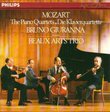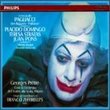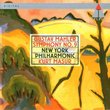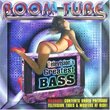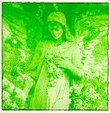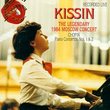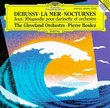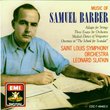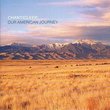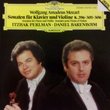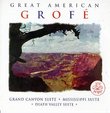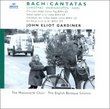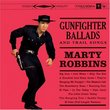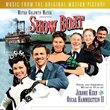| All Artists: Richard [1] Strauss, Kurt Masur, Gewandhausorchester Leipzig, Jessye Norman Title: Strauss: Four Last Songs/Songs With Orchestra Members Wishing: 0 Total Copies: 0 Label: Polygram Records Release Date: 10/25/1990 Genres: Pop, Classical Styles: Vocal Pop, Opera & Classical Vocal Number of Discs: 1 SwapaCD Credits: 1 UPC: 028941105226 |
Search - Richard [1] Strauss, Kurt Masur, Gewandhausorchester Leipzig :: Strauss: Four Last Songs/Songs With Orchestra
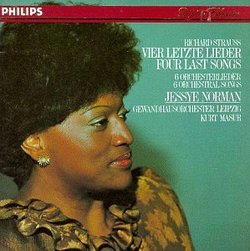 | Richard [1] Strauss, Kurt Masur, Gewandhausorchester Leipzig Strauss: Four Last Songs/Songs With Orchestra Genres: Pop, Classical
Jessye Norman has what they call in the operatic business an "ample" figure. Judging from this disc, she must be completely hollow inside because she sings the Four Last Songs in what seems like a single breath, and at hal... more » |
Larger Image |
CD DetailsSynopsis
Amazon.com essential recording Jessye Norman has what they call in the operatic business an "ample" figure. Judging from this disc, she must be completely hollow inside because she sings the Four Last Songs in what seems like a single breath, and at half the normal speeds. In fact, as sheer sound, this is the most sensual, voluptuous, totally gorgeous vocal record that I have ever heard. Play it for people who think they hate opera singing and they'll be hooked. Words really can't describe the almost decadent richness of Norman's voice, or the way it seems to swell from the speakers and saturate the room with velvety sound. --David Hurwitz Similar CDs
Similarly Requested CDs |
CD ReviewsGreat interpretation Michael Newberry | Santa Monica | 03/29/2000 (5 out of 5 stars) "My two choices for Four Last Songs of Richard Strauss are the Norman and the Schwarzkopf versions. Going by sound Jessye Norman and Kurt Masur combine to make beautifully phrasing-her sound is rich, pure, and arches over the heavens. By comparison Elisabeth Schwarzkopf's voice sounds a tad smaller, but her interpretation of both the music and the lyrics is integrated so well that you are swept into the conception of the piece. In song 2, SEPTEMBER, when she sings, Lange noch bei den Rosen, Bleibt er stenhen, sehnt sich nach Ruh, (Long by the roses, it tarries, yearns for rest), I can feel the length of the stem and the bloom of the rose and I feel I am calm, lying in a quiet garden. But my first choice is the Norman, my soul takes wing and I am gone! Both have good booklets, with German text and English translations, though the text and translation is not side by side in the Norman. They both included several other Strauss songs with full orchestra, equally excellent." Hauntingly memorable and deeply emotional Ralph Protsik | 03/28/1999 (5 out of 5 stars) "The inspired combination of the heart gripping music of the Richard Strauss Four Last Songs with the heavenly voice of Jessye Norman has made this recording my most favourite music. Time and time again I return to its hauntingly memorable, deeply emotional sound. No other piece of music so commands my total attention as these pieces. And the lieder which follows the Four Songs are by no means musical 'stocking-fillers'. Norman's mellifluously gorgeous voice sweeps effortlessly to the higher notes and exhibits an astonishingly smooth control throughout the entire recording. Its unparalled quality has motivated me to buy this CD for friends on no less than five previous occasions. It is a stunner ! And it takes ones breath away with its blazing beauty. Peter Donoghue" Norman Conquests Grady Harp | Los Angeles, CA United States | 02/06/2005 (5 out of 5 stars) "Some recordings captured when singers were at their splendid best (and now thankfully digitally remastered so that the acoustics remain au courrant) are simply staples of the music library. This recording made in 1982 (!) remains a benchmark in the great recordings of Richard Strauss' magnificent 'Vier letzte Lieder', right up there along with Schwarzkopf, Janowitz, and Popp. In collaboration with Kurt Mazur and the Gewandhaus Orchestra, this reading of the 'Four Last Songs' is languid, full of recall of a life spent and resignation to the concept of mortality.
Norman takes her time with the beauty of the phrases, lingering over each of the thoughts and contemplative passages, and sounding absolutely luxurious of tone and intelligence. For those deeply moved by some of the non-Philip Glass music used in 'The Hours' film, then here is the recording used as background in Clarice's home as she prepares her party for her dying friend. Equally lush are the accompanying Norman readings of six of Strauss' more familiar songs for voice and orchestra: 'Caecelie', 'Morgen', 'Wiegenlied', 'Ruhe, meine Seele', 'Meinem Kinde', and 'Zueignung'. Bliss, this. For soul enrichment place this miraculous CD to play in a quiet room at sunset and the subsequent gloaming and feel this Norman conquest. Grady Harp, February 2005" |

 Track Listings (10) - Disc #1
Track Listings (10) - Disc #1